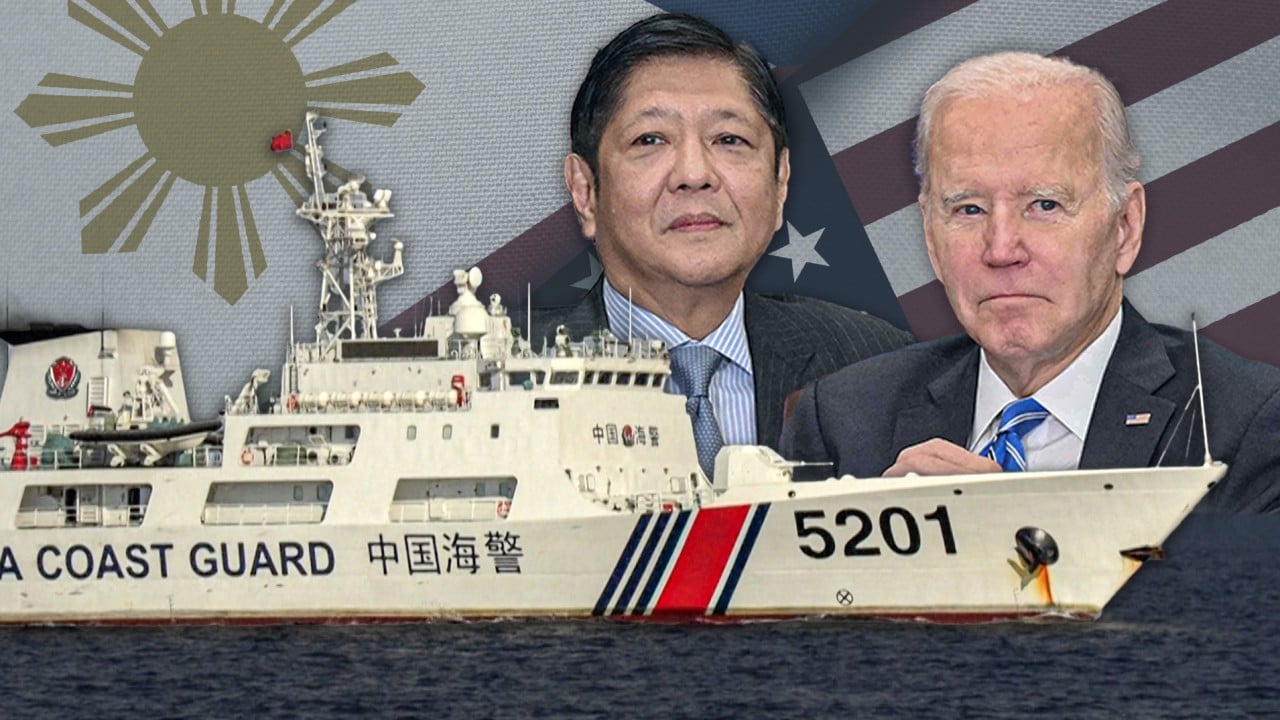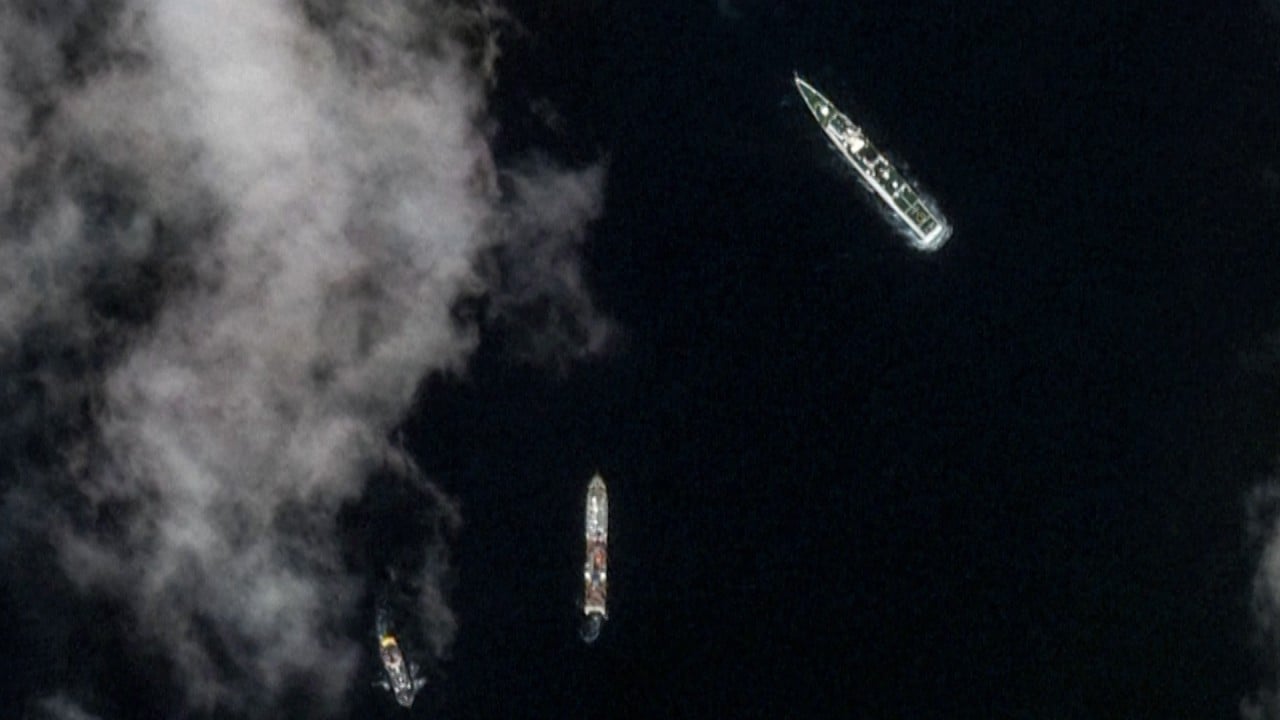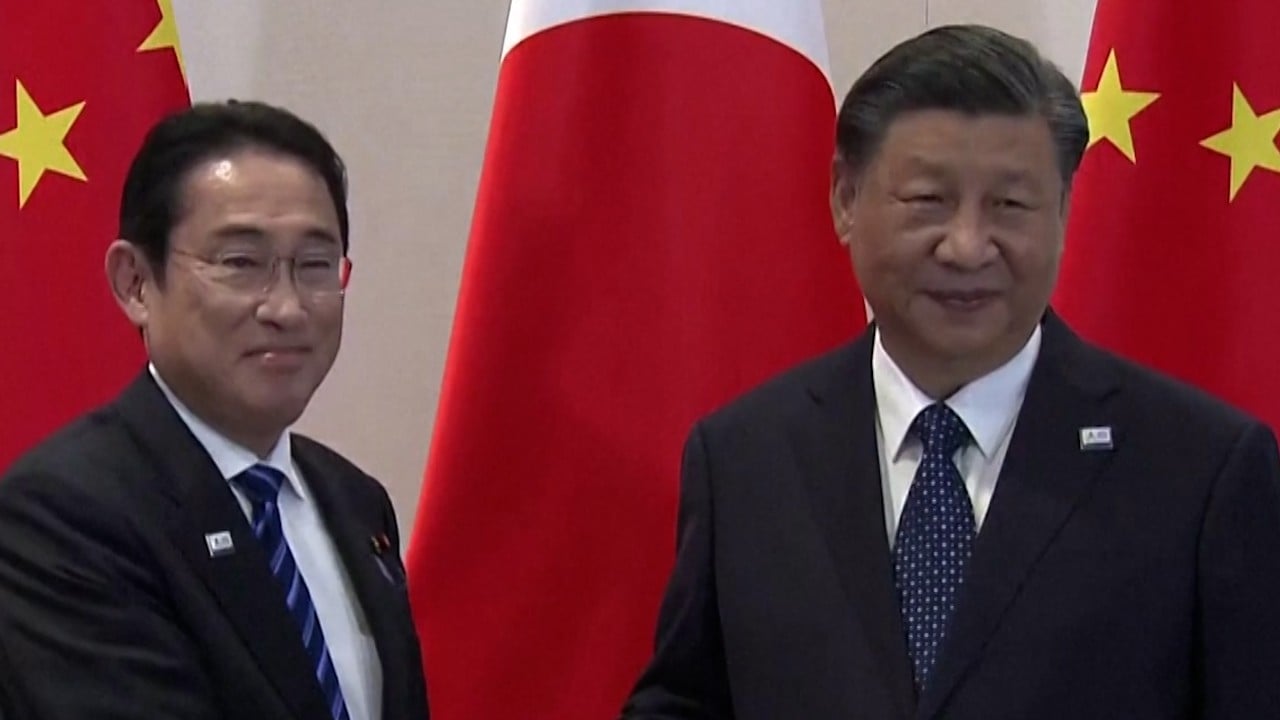
‘Only negatives for China’ as Biden readies for trilateral Camp David rerun, this time with Marcos Jnr and Kishida
- Beijing’s growing military might, especially in the South China Sea, and Taiwan Strait concerns seen as driving forces behind summit
- US strategic containment aims remain ‘rock solid’, analyst says, as another forecasts just negative reactions from China, varying only in degree
Analysts said the urgency driving the summit was China’s growing military might, especially in the South China Sea where its territorial disputes with the Philippines have sparked maritime face-offs, as well as shared concerns over tensions in the Taiwan Strait.
The meeting will also be an opportunity for the US and its two treaty allies to institutionalise their three-way defence arrangement, further deepening security ties as a counterweight to China, the observers said.
A wary Beijing closely watched that summit, and will be doing the same this time around, according to the analysts, with one expecting only negative reactions from China no matter what level of cooperation is reached.
Zhu Feng, executive dean of the School of International Studies at Nanjing University, said Beijing might view the April 11 summit as not only a continuation and extension of the one in August, but also the latest attempt by the US to forge defence partnerships with an eye on China – such as Aukus with Australia and the United Kingdom.
“From China’s perspective, the April leaders’ meeting is one more geopolitical move by Washington to expand its strategic intervention in the South China Sea,” he said, adding that Washington was keen to set up small regional alliances to collectively contain China.
Philippines boosts maritime security as tension with China boils over
Zhu said the coming meeting was proof that, even after November’s long-awaited US-China summit in San Francisco and continued high-level dialogue since then, Washington’s strategic containment of Beijing was still “rock solid”.
During a visit to Manila by US Secretary of State Antony Blinken, his Philippine counterpart Enrique Manalo said the three leaders would aim “to capitalise” on existing relations.
Blinken also said a trilateral relationship with Japan would serve as “a very important platform for building even greater stability and deepening peace [in the Indo-Pacific].”
According to Kei Koga, associate professor for public policy and global affairs at Singapore’s Nanyang Technological University (NTU), Beijing’s response will probably be shaped by the outcome of the summit.
A negative diplomatic reaction is likely if the summit is limited to dialogue, he said, but a stronger response might be expected if there are signals of greater maritime cooperation in the South China Sea.
“But either way, China’s reaction will be negative.”
China might also “test the degree to which these trilateral initiatives can be serious by temporarily increasing its maritime presence”, he added.
Observers also believe the timing is right to formalise the trilateral cooperation, with the US, Japan and Philippines already upgrading bilateral defence ties.
Chester Cabalza, a security strategist and founding president of Manila-based International Development and Security Cooperation (IDSC) think tank, said the coming summit might be the “best time to formalise a triangular defence arrangement”.
“This emerging triad will certainly set new parameters for building a network of strategic alliances to deepen defence ties based on mutual trust and common threat,” Cabalza said.
Relations between Japan and the Philippines have grown closer in recent years, and Tokyo us one of the main donors to Manila’s economic and development initiatives. Japan’s first overseas security assistance project also went to the Philippines, with a US$4 million grant to boost coastal radar systems announced in November.
Tokyo and Manila are also negotiating a reciprocal access agreement for their militaries, potentially paving the way for joint drills and training. It would be the third such agreement for Japan, after those with Britain and Australia.
Manila already has such an agreement with Washington under the Visiting Forces Agreement effective in 1999, which lets the US side host joint military exercises and operations in the Philippines.
The 2014 Enhanced Defence Cooperation Agreement also increased the non-permanent presence of US military forces in the Philippines, apart from expanding US access to Philippine military bases.
Ding Duo, an associate research fellow at China’s National Institute for South China Sea Studies, forecast the creation of a trilateral mechanism to advance “more substantial security and defence cooperation”.
“It may include more joint air and sea patrols, increased frequency of military drills, greater support for equipment and funding, and enhanced interoperability of the armed forces when it comes to the Taiwan crisis,” Ding said, adding that deeper integration of military capabilities was likely.
While China remains the most important topic for all three countries, the summit was unlikely to focus only on that, Koga at NTU said.
Non-traditional security issues, such as cooperation on humanitarian assistance and disaster relief would also be discussed, while economic issues such as supply chains and decarbonisation were also likely to be on the agenda, he said.
However, the analysts were united in warning that the summit was unlikely to be good news for China.
Both Manila and Tokyo have territorial disputes with Beijing, in the South China Sea and East China Sea, respectively. Meanwhile, the US is China’s biggest geopolitical rival and increasingly critical of its growing military might in the disputed areas.
IDSC’s Cabalza said that the coming together of three of China’s most vocal critics would definitely “make more noise in the international community.
Ding was of the same view, and said the three were likely to coordinate moves to exert pressure on China over the disputed waterways and in the Taiwan Strait.
Beijing sees Taiwan as part of China to be reunited by force if necessary. The US, like most countries, does not recognise the self-ruled island as independent but is opposed to any attempt to take it by force.
Duterte-Xi allegedly made ‘gentleman’s agreement’ for status quo in disputed sea
Manila has expressed worries in the past about a possible cross-strait conflict, with Marcos saying last year that “it is very hard to imagine a scenario where the Philippines will not somehow get involved” in such a conflict due to its proximity to Taiwan.
The Philippines’ strategic location makes it valuable to both the US and Japan as they seek to improve their responsiveness to any regional crisis, making Manila an important part of any coordinated move to deter Beijing.
But the emerging bloc is likely to further escalate tensions in the region, the observers warned.
Ding said such a network of smaller regional security and defence partnerships – purposefully aimed at China – would further strain regional ties, potentially increasing the risk of maritime frictions.
While the alliance would not deter China from defending its sovereign rights, it does have other concerns, Ding noted.
“Beijing is more concerned about the return of cold war-like bloc confrontation, like such alliances, which would exacerbate geopolitical divisions and antagonisms in the Indo-Pacific, where the consequences have to be borne by the region,” he said.
Koga said another driving force behind the summit was the imminent transition of power in the US and Japan.
Japanese lawmaker says US Steel deal would help counter China dominance
The US presidential election in November will probably see a rematch between Biden and his predecessor Donald Trump, while Kishida’s leadership of the ruling Liberal Democratic Party is set to be put to the test in a vote in September amid an internal fundraising scandal.
“By institutionalising these trilateral frameworks, they aim to consolidate the relationship, so that it will not be affected by the leadership change,” Koga said.




